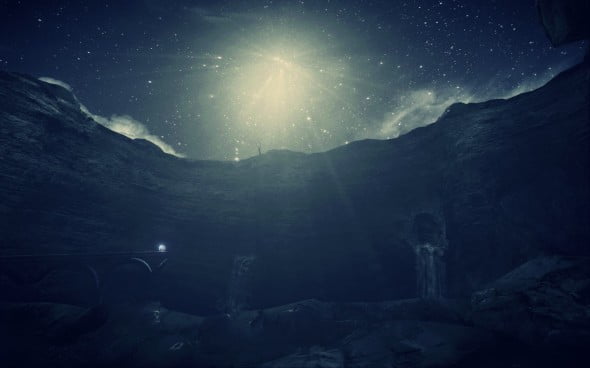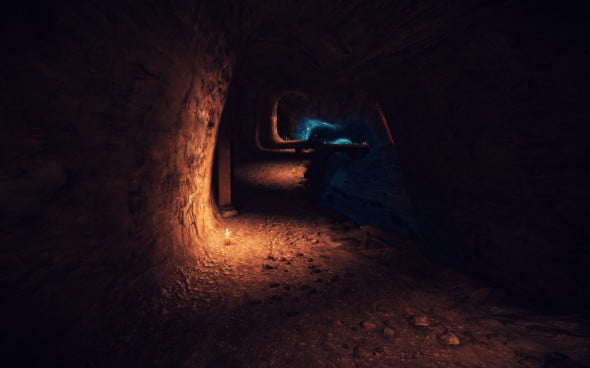Developer: Carlos Coronado
Publisher: Carlos Coronado
Platform: PC (Steam)
Release Date: August 5th, 2014
If there’s one thing game developers are good at, it’s playing it safe. Ubisoft ensures all of its big budget releases are homogenized and (aesthetics notwithstanding) identical, while other companies seek to plagiarize popular ideas in the hope of capitalizing on “market trends”. Even in the indie PC space, developers are jumping at the chance to create half baked survival sims in a mad chase for a piece of tasty DayZ pie. Mind: Path to Thalamus is a game that doesn’t know what “playing it safe” means, it throws ideas around like curve balls, then throws extra curve balls at those ideas like some sort of mad game of idea-squash. Mind bends the rules of video games almost to their breaking point, and never expects any less of you than total co-operation. Its slightly clumsy narrative and insistence on constantly using visual metaphors might not always work, but Mind: Path to Thalamus is always beautiful, and always interesting, even when it doesn’t quite succeed in its mission.
Mind follows the the journey of one man through the depths of his own comatose mind. After abandoning his daughter during the very disaster which left him bed-ridden, he searches through his mind to find a sense of atonement and forgiveness. On some levels, presenting this kind of story through puzzles and physical manifestations of emotions works, and on others it doesn’t. This sort of thing worked really well in Among the Sleep, and to a certain extent it does in Mind. The clever use of pathetic fallacy within the game’s weather manipulation puzzles is a unique and interesting touch, and the game’s environments definitely feel surreal enough to genuinely represent a person’s subconscious. However, Mind falls short when it tries to dump truckloads of exposition via some occasionally spotty narration. Mind doesn’t ramble through high minded rhetoric in the infuriating style of Dear Esther, nor does it simply tell the story plainly in layman’s terms, it lands somewhere in between. Said narration often struggles to put across key aspects of the narrative, instead throwing themes and motifs at the player rather than expecting players to connect the events which transpired within the game’s back story and the things encountered within the protagonist’s mind.

That’s not to say that the game’s plot isn’t interesting on a fundamental level. The story of a man whose sister and daughter have both died in natural disasters he feels responsible for is a great hook, but when said sister and daughter are both called Sophia, and the character never specifies which character or disaster he is talking about, things can be a little tough to follow.
Mind makes up for some shaky narrative execution in two key areas though: its mind bending puzzles, and its production values. Since Mr Coma is a storm chaser and weather expert, the puzzles within his comatose fantasy take on the form of weather manipulation tasks. These involve learning a set of key rules about specific natural effects and how they change the world around them, namely: fog, time, darkness and rain. By finding orbs and placing them within the correct receptacles, one can change and combine these natural effects; manipulating fog opens up blocked passages, changing time reconstructs platforms that have been destroyed over time, making things darker will reveal glowing doors of lights and extra orbs, and bring forth storms will raise wooden platforms. This all sounds rather strange in writing, but learning how these effects combine and contradict each other is extremely satisfying, as is solving each puzzle. So rewarding is the absorption of new rules and information in Mind, that one can feel a little cheated when the game’s puzzles go off book and don’t play by their own rules. Other puzzle highlights involve traversing invisible platforms, something which would usually feel like a nonsensical cop out, but actually feels like a genuinely unique and intriguing obstacle to traverse.

Occasionally orb puzzles get a little frustrating, particularly when Mr Coma decides to let go of the orbs and throw them around with reckless abandon. Sometimes clicking picks up the orbs, and sometimes just hovering near them achieves the same goal. A more concrete and reliable method of picking up and holding the orbs would have made certain puzzles feel less like a game of magical mind-bowling.
Thankfully, time spent chasing orbs or figuring out what your next move should be takes places in some of the most beautiful locations I’ve seen in a game all year. Everywhere you go in Mind is gorgeous to behold, from sound and art design to basic graphical fidelity. Shadows play across barren plains, fog stretches across stormy hilltops, trees turn from summer green to autumn red; every change in nature is wonderful to see and hear, and puzzles feel manageable and intuitive not through nagging tutorials and hand holding, but through clever placement of props and helpful sound cues. Mind is a game that uses art and sound in perfect synchronization with its puzzles, so the act of completing these often bizarre activities is almost always a joyous experience.

Path to Thalamus only loses momentum when it strays away from what it does best. Mind excels at delivering stunning puzzles that require you to have patience and think outside the box, so it’s a shame to see the game descend into hokey meta-wank puzzle bosses in its third act. Although the final boss does boast some great puzzle action, the pace at which these must be solved is antithetical to the style and speed of the rest of the game. The same can be said for an earlier “boss”, which requires very little actual brain power at all, and rewards players for their ability to outrun a giant monster. These moments are unfortunate, but they don’t sour the overall ingenuity of this utterly unique game.
In a way, Mind is not greater than the sum of its parts. Most of the game’s individual puzzle vignettes are so unique and rewarding that they are worth the price of entry alone, they just don’t manage to coexist with the game’s interesting albeit wonky tale of weather and woe. Still, Mind is one of the most gorgeous looking and tightly designed puzzle games available on PC right now, one that takes simple, elegant 2-D puzzle design and brings it into a vibrant and glossy 3-D space.
Review Overview
Score:
4/5
Although Mind: Path to Thalamus stumbles with the sheer volume of themes and events it tries to portray, it must be commended for being one of the most unique and rewarding 3-D puzzle games around. Arguably a narrative failure, but a mechanical and artistic masterpiece all the same.